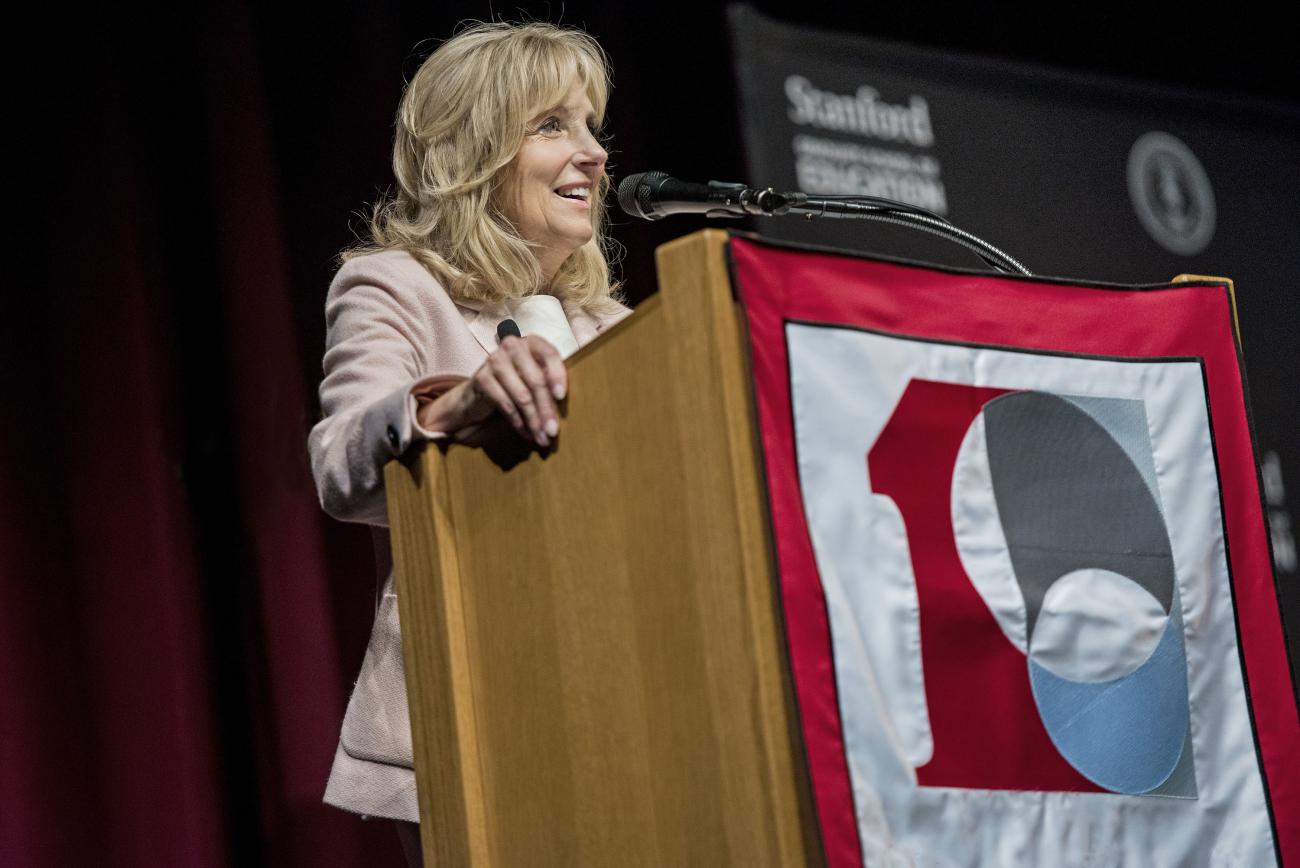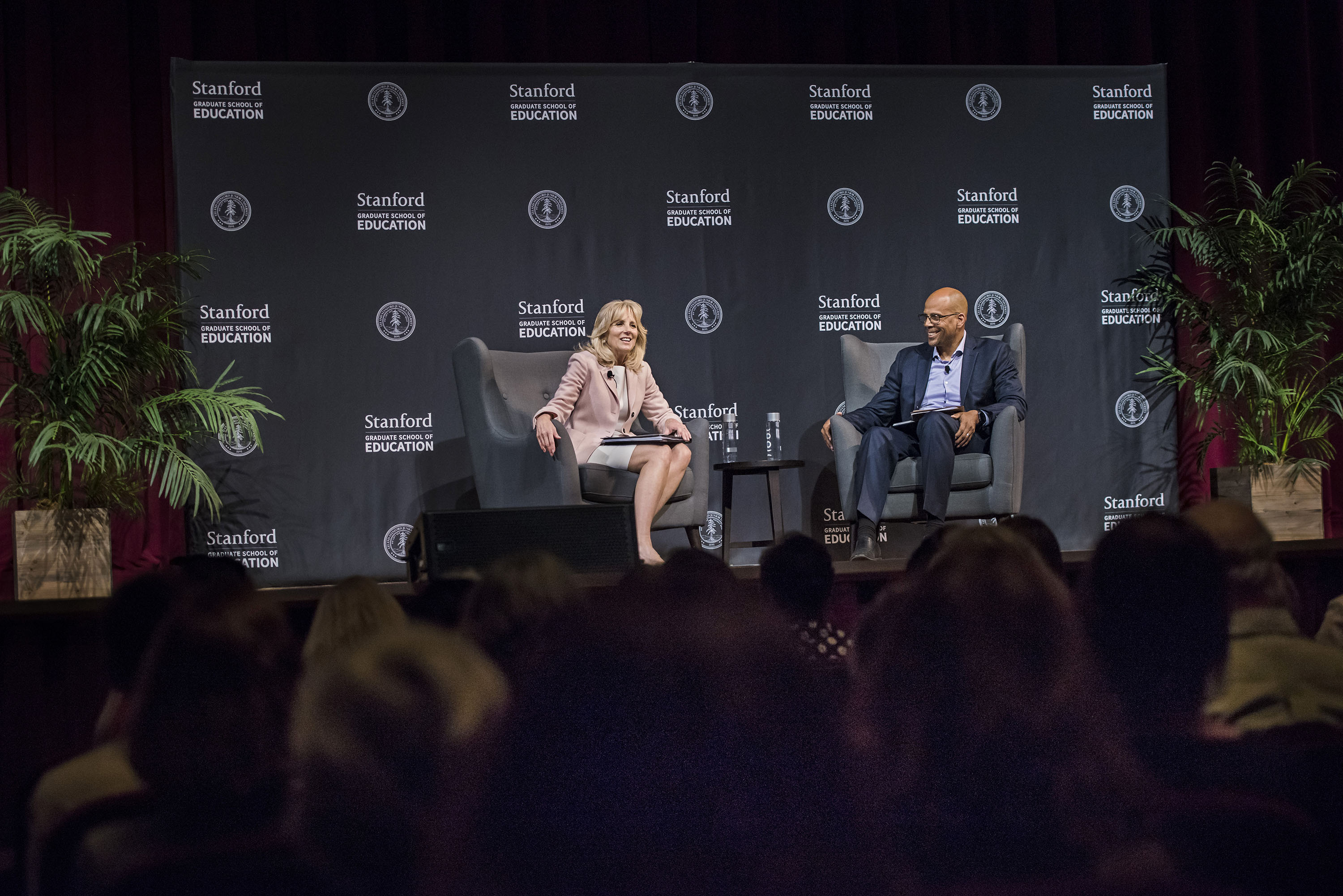
“Education is possibility set in motion,” said former Second Lady of the United States and longtime teacher Dr. Jill Biden at Stanford on Wednesday in an inspiring Cubberley Lecture that focused on teachers as exemplars and transmitters of humanity.
“Just as important as the practical argument is the civic one,” said Biden, who has taught writing in high school and community college for more than 30 years. “Education teaches us compassion and kindness, connection to others. Education doesn’t just make us smarter. It makes us whole.”
The Cubberley Lecture, inaugurated in 1938, is the Stanford Graduate School of Education’s premier showcase for ideas. In inviting a classroom teacher – albeit one with unusual windows onto power that give Biden what she calls a “dichotomous” life – the GSE, a broad-based research and professional school, proclaimed the value of teaching in general and Biden’s compassionate, holistic teaching practice in particular.
“As Second Lady, Dr. Biden had responsibilities that are hard to imagine, but she always kept teaching, because that is who she is. She is our kind of person,” said Daniel Schwartz, dean of the GSE, who introduced Biden to the capacity crowd of 1,700 and large web-stream audience at Stanford’s Memorial Auditorium. Biden's visit to Stanford included meeting with students in the Policy, Organization, and Leadership Studies program and hearing them present on a research project.
Biden spoke at Stanford the day after giving finals at a community college in Northern Virginia, where she is a full-time professor of writing. She noted to audience cheers that the scheduling placed her talk in the midst of Teacher Appreciation Week.
“Whenever you travel, whenever you meet another educator, it’s like an instant relationship,” she told the crowd.

Always a teacher
Biden’s husband, former Vice President Joe Biden, served with President Barack Obama from 2009 to 2017. Jill Biden is thought to be the first U.S. vice-presidential spouse to work full time for pay during her husband’s term.
“When we won the election in 2008, no one really expected me to keep teaching,” she said. “I couldn’t just walk away. I couldn’t just live Joe’s life.
“So I did both. I went to state receptions with the most powerful men on Earth, then to study sessions with single mothers just hoping to get a job.
“There was a little nook on Air Force Two that contained the vice-presidential seal, and I would sort of wedge myself in there and grade papers on the floor.”
Biden described herself as “a practitioner of my craft, not a policy expert.
“But I think policy should always start in the classroom, and it must be flexible enough to allow teachers to choose the best path for their particular circumstances.”
In Washington and today, as chair of the Biden Foundation and of College Promise, Biden has translated her classroom insights into advocacy for education as career preparation and for community colleges as doors to opportunity. Most of all, she advocates for the resources and support that will sustain teachers as transmitters not just of academic content but of morality, compassion and human values.
“Jim Crow laws no longer exist. But poverty and ZIP codes often play the same role,” Biden said. “Resources are stretched paper-thin. I find that in my own classroom I’m providing books and breakfast bars to students who need them.
“And in the past 10 years, with the increased threat of violence and with school shootings, some teachers have become the unfortunate heroic martyrs of their times. Now, along with telling students where the fire exits are, I say, ‘This is what we do in case of an active shooter.’”
Biden reminded the audience of Martin Luther King’s speech in Memorial Auditorium more than 50 years earlier.
“The ability to create educational road maps is deeply connected to the health of our communities,” Biden said.
“As Dr. King said, ‘The moral arc of the universe is long, but it bends toward justice.
Creating community
As Second Lady, Biden continued to teach during her own crises including son Beau’s illness and death from brain cancer. On one bad day, Biden said, she momentarily turned to her whiteboard to hide incipient tears and turned back to find her students standing to each give her a hug.
“We often don’t know how much someone needs our grace, our strength,” she said. “As teachers, you will need to know two things. When to ask for help, and when to give it. We lead by what we do, not what we say.
“Often, it doesn’t take that much to be that strength in return. I believe I am a much more compassionate teacher because of my life experiences than when I began.”
Biden followed her talk with a question-and-answer session led by Jim Shelton, MA/MBA ’93, who served as Obama’s deputy secretary of education and now heads the Chan Zuckerberg Initiative’s education division.
In reviewing Biden’s long career, Shelton asked her what about teaching hasn’t changed.
“Lack of resources,” Biden replied to audience applause. “We don’t have mental health services, and I deal with students who are really struggling with major issues.”
But Biden praised cities that have initiated comprehensive wraparound services, such as health care and services for housing-insecure students in Portland, Oregon.
She also urged the future teachers in the audience to quickly learn their students’ names as a way of creating community in the classroom.
“I have about 80 students,” she said. “That first week I make sure I learn everybody’s name. I make that personal connection.
“I make them learn everybody else’s name, too. You’ve all felt it. You go to a new school, you feel weird. But if you know somebody’s name – you feel better.
Teachers also need to know how to address all different kinds of students in the classroom, Biden said: “Students who are on the autism spectrum; who have Tourette’s. Who are from military families” – a particular Biden cause because of Beau’s National Guard service.
“Teachers have to know to identify the important facts in the children’s lives.”
Shelton asked Biden about her work for community-college access. Biden’s University of Delaware doctoral dissertation examined student needs affecting community-college retention. In Washington and now through College Promise, she has backed localities’ efforts to make community college free.
“Education is so expensive,” Biden said. “One of the greatest things about community colleges is that they have reciprocity agreements with four-year colleges. If students’ GPAs are high enough, they can slide right in as juniors. There is a stigma attached; I get that. We need to work on that.”
Biden concluded her talk with the example of her grandmother, a teacher in a one-room school who sometimes brought the young Jill to class and let her ring the old-school bell.
“When I think about that bell, I think about her legacy,” Biden said. “Of education that has rung out into the world like waves of sound.
“The poet Rumi wrote, ‘Let the beauty of what you love be what you do.’
“We have all taken different paths to get here,” Biden said. “But we’ve gathered to do the same thing: to lift up our communities together.”



